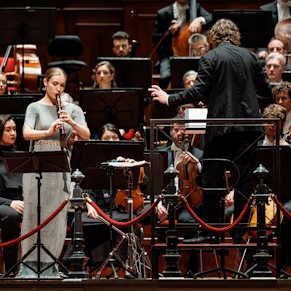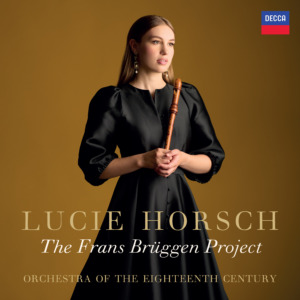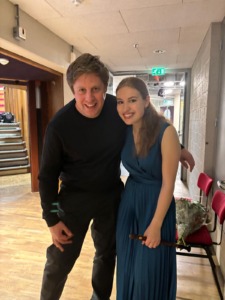Lucie Horsch - Press Reviews

Premiere: Lotta Wennäkoski’s Vents et Lyres
Lucie Horsch scatters cartloads of notes across the packed hall, all with the ease of brushing lint off the sofa. Enormously multi-talented – she also studied piano and singing – she proves to be the possessor of a beautiful mezzo-soprano voice, which she lets shine delightfully above the orchestra like early morning sun, especially in the final movement.
Maurice Wiche, De Limburger, 19 October 2025
This was not the usual fare from the Netherlands’ favourite recorder player. Instead, high drama abounded and not just from the array of recorders cleverly deployed to periodically transform the mood. . . . Horsch talks of her love of contemporary music and of how “good composers work beyond the limitations of the instruments,” creating their own language and surprising the audience. By definition, Wennäkoski’s concerto fits the bill perfectly, challenging audience and soloist alike as a vast array of sound effects (often echoed in the orchestral parts) flew all around: multiphonics, jazzy ‘wah-wahs’, harsh staccato tonguing effects on the tenor, and didgeridoo-like sounds… to name a few. The very warm response from the hall will perhaps ensure the fate of this valuable and technically challenging addition to the recorder canon.
Clare Varney, The Spidy Editor, 19 October 2025
Horsch rises to the challenge and colours Wennäkoski’s palette with determination and passion on various recorders and with her voice. . . . Replace the myth’s Orpheus and his lyre with Lucie Horsch and her recorder . . . Horsch, too, enchants with her body and soul – her technique and music are one.
Frederike Berntsen, Het Parool, 17 October 2025
As Vents et Lyres progresses, nuances become audible, captivating from beginning to end: the haunting baroque, Petra van der Heijden’s harp, angelic yet merciless, and Horsch’s singing voice, warm and full with a slightly husky upper edge.
Maartje Stokkers, Volkskrant, 16 October 2025
The absolute highlight of the evening was Lotta Wennäkoski’s Vents et Lyres . . . [Lucie Horsch] plays inpeccably, very rhythmically and extremely agile and musically – she often literally enters into dialogue with the orchestra, a delightful spectacle. At times frenetic, exciting and spectacular, at others calming and soothing, but always with spirit, narrating the structure of this concerto with complete clarity and logic – a unique achievement in a world premiere.
Peter Schlamilch, De Nieuwe Muze, 16 October 2025
Album: The Frans Brüggen Project
…nothing short of revelatory – a recording that combines historical authenticity with vivid musicianship, a disc that successfully marries technical excellence with such engaging musicality. The Frans Brüggen Project offers a fresh perspective on familiar repertoire while showcasing the remarkable versatility of both performer and instruments. Through-out, Horsch’s technical command and musical intuition shine through in performances of remarkable clarity and emotional directness.
Andrew Palmer, Yorkshire Times, 19 January 2025
… the vitality and freshness on this, her latest and arguably most ambitious album, is due less to Brüggen’s inspiration and more to the unique circumstances under which it was recorded … Horsch is as sensitive to each instrument’s idiosyncrasies as she is to the demands of the music, her effortless virtuosity and stylish phrasing, articulation and ornamentation a veritable Recorder Fancyer’s Delight.
William Yeoman, Gramophone, December 2024
Lucie Horsch pays a moving tribute to recorder legend Frans Brüggen. Lucie Horsch did not know Frans Brüggen, yet his widow calls her his ‘musical grandchild’. This is because of Horsch’s way of making music: in the spirit of the recorder player, conductor and early music pioneer who died a decade ago. Like him then, she becomes one with the instrument; her breath becomes music.
Maartje Stokkers, De Volkskrant, 21 November 2024
Ten years after Brüggen’s death, [it is his] achievement as an instrumentalist that is celebrated on Lucie Horsch’s disc. More specifically it’s the remarkable array of recorders from the late 17th and early 18th centuries which he collected and played that are in the spotlight here, all of them documented, together with illustrations, in the accompanying CD booklet… Horsch uses 15 different instruments – sopranino, descant, treble and tenor recorders – some of which are now so fragile that she was only able to record a couple of takes on each. There is a mixture of original pieces – by Telemann, Handel, and Couperin, among others – alongside arrangements of Haydn, Marcello and Bach, with the Orchestra of the Eighteenth Century used for the larger-scale movements. For once it’s the instruments that matter more than the music; anyone remotely interested in recorder playing will find it fascinating.
Andrew Clements, The Guardian, 8 November 2024

Commission: Reza Namavar’s Fetiapoipoi (The Morning Star)
Lucie Horsch will leave you breathless listening to a Vivaldian fever dream … [Lucie Horsch] sings elongated quotes from Sovente il sole in the second movement, until the tension is released in a percussive final section. A wondrous and successful work that you will want to listen to more often.
Marnix Bilderbeek, NRC, 24 May 2024
Recorder stars are thin on the ground worldwide, but in the Netherlands they pop up every now and then to enrich musical life with the force of a comet with superior virtuosity on this surprisingly versatile instrument … The irresistibly pure and passionate musician Horsch managed to win over all hearts not only as a recorder player but also as a singer. The orchestra bravely resisted and let her frolic above a solo orchestral part, resulting in a magical experience for the audience.
Wenneke Savenije, De Muse, 27 May 2024
Composer Reza Namavar cleverly exploits the sparkling wit of recorder prodigy Lucie Horsch. What makes [her] special, besides her stunning virtuosity, is the way she communicates with her audience … Horsch is also a mezzo-soprano (and pianist, though not tonight) and an interesting programmer … she put together an evening of Bach and Vivaldi and asked composer Reza Namavar to write a recorder concerto for her and the Orchestra of the Eighteenth Century … First, the recorder flutters above unruly trembling and pounding strings. In the middle movement, a theorbo gently drips while Horsch sings snippets from Vivaldi’s aria Sovente il sole. Finally, the plucked cellos and double bass excite the recorder player to play faster and faster and higher. The wriggling figure at the end is a nod to Stravinsky’s Le Sacre du Printemps.
Jenny Camilleri, Volkskrant, 26 May 2024
